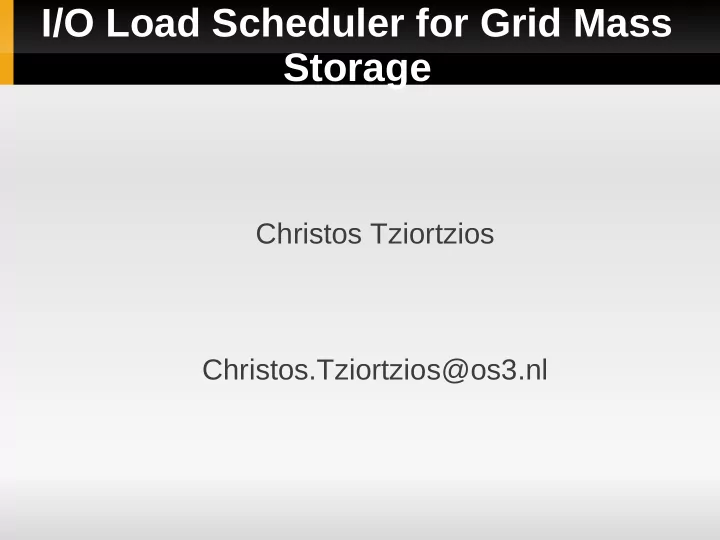

I/O Load Scheduler for Grid Mass Storage Christos Tziortzios Christos.Tziortzios@os3.nl
Introduction SARA manages enourmous amounts of data produced by CERN (LHC), LOFAR and more More than 5 PB stored on tapes at the moment Hierarchical Storage Management Disk front end Tape back end
Research Question Is it possible to use an intelligent scheduling mechanism in order to control the data flow between the Front End Storage and Grid Mass Storage more efficiently?
Infrastructure Front End Storage 48 Nodes GridMS 4 Data Movers (DM) 5 Tape Movers (TM) 20 Tape Drives 33 TB disk Data Migration Facility (DMF) takes care of put and get operations
Performance Issues Random I/O leads to drop in performance. No job scheduling on groups of FES Nodes or User level. Only one transfer per FES node at a time, may lead to idle bandwidth Limited disk bandwidth
Disk Bandwidth Problem
Operations Operations between FES and GridMS (handled by our scheduler) Store Restore Checksums (Both in FES and GridMS disk) Operations between GridMS disk and Tape (handled by Data Migration Facility) Put Get
Software Used TORQUE resource manager Normally gives processes access to CPU time or memory We are interested in disk I/O and bandwidth Maui Cluster Scheduler Scheduling and Fairshare options
Tests and Results (1) No test environment Store and Restore jobs first submitted to the queue Successfully checked Priority and Fairshare Components Priority depending on User Fairshare based on short term historical data Maui overrides TORQUE priorities Different Maui and TORQUE configurations tested Node allocation
Tests and Results (2) Requesting resources Walltime: predicted by user. Disk space: only works for one filesystem, SARA plans to have multiple, one filesystem for each project Tradeoff: Accurate requests for resources increase efficiency - underestimating resources may lead to killing jobs
Conclusions Implemented a prototype solution for store and restore operations. Advanced Scheduling. Idle bandwidth would no longer be a problem. Disk space resource would work with the current infrastructure but not with multiple file systems. Current scheme works reliably. Changes in the working environment may introduce bugs. Reliability: Testing environment needed.
Questions
Recommend
More recommend